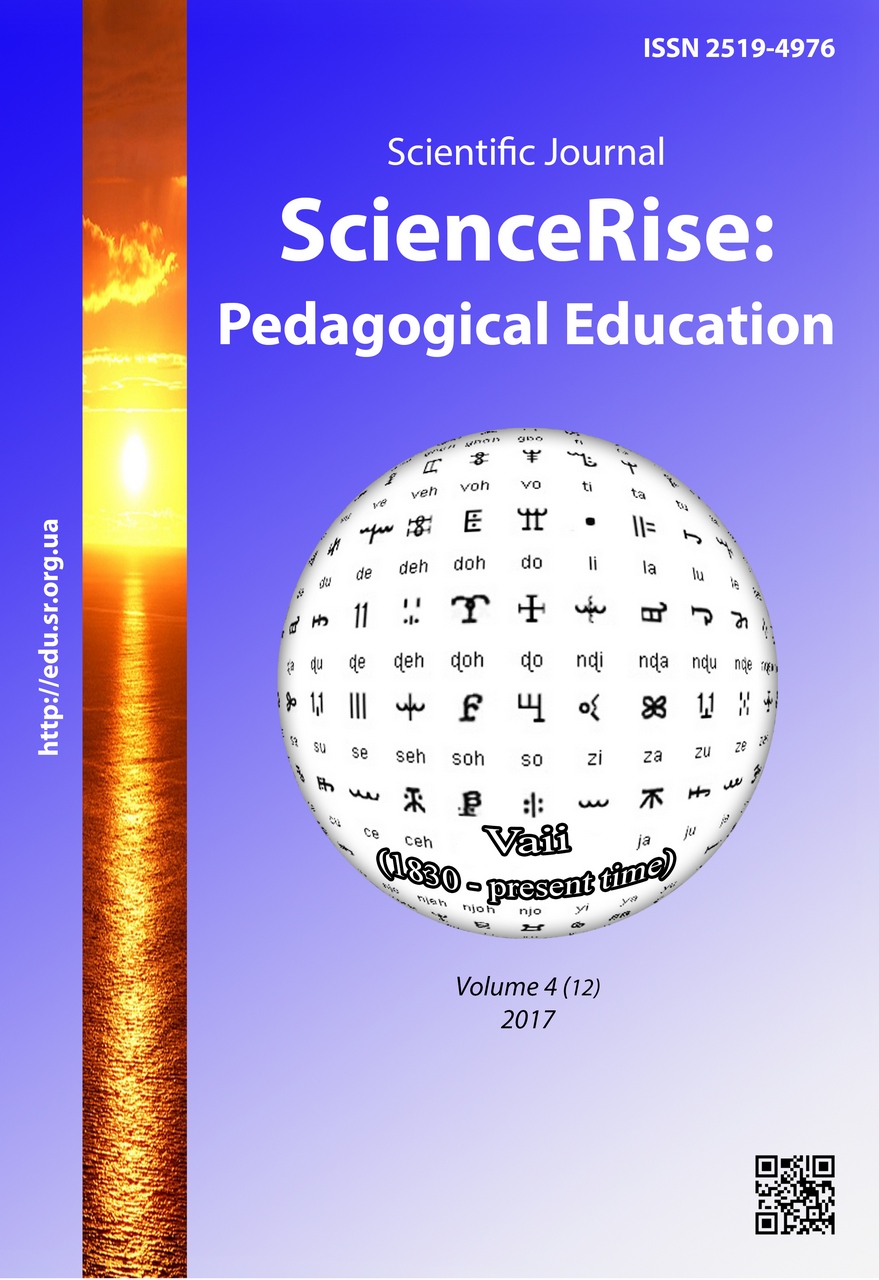Informational-technological support of professional training of teachers in the system of postgraduate education
DOI:
https://doi.org/10.15587/2519-4984.2017.100109Keywords:
informational-technological support, postgraduate education, informatization of education, informational resources, informational-communicational technologiesAbstract
The problems of informational-technological support of professional training of teachers in the system of postgraduate education are considered in the article. The use of informational technologies in all fields of the life determines the essence of changes in educational system. That is why the notion of open education during the life, innovative character of education in informational society and its virtualization are urgent. The stable dependence between the effective activity of a teacher and the level of its professional competence, that is mainly determined not by the volume of mastered content of knowledge but by the development of thinking, ability to self-control of activity, ability to self-education during the life, continuous self-improvement, is observed now.
So the determinative precondition of effective professional training of teachers of secondary schools in the system of postgraduate education under conditions of informational society development is a process of improvement of professional qualities and development of teacher’s skills during the whole life, because basic knowledge and skills become insufficient for realization of working tasks with time.
Just introduction of informational-technological support of teacher’s professional training in the system of postgraduate education is an effective instrument that realizes the educational principles during the life and favors professional development of teachers, is able to provide communication between all subjects of educational system, continuous consulting, informing and renewal of learning materials at all stages of the study.
Organization of the study of teachers in the system of postgraduate education using informational-technological support must take into account the features of adult training. Because just the use of informational-technological support for professional training of teachers and their comprehension of informational-communicational technologies as an instrument and environment of professional development, readiness to the study with informational-communicational technologies is an indicator of ability to professional development and self-development, level of informational-communicational competence formation, main directions of their improvement.
The use of informational-technological support of teachers’ professional training in the system of postgraduate education opens the considerable possibilities as to creation of continuous education of a teacher according to the modern educational requirements
References
- Gurevich, R. S., Kademiya, M. Yu., Shevchenko, L. S.; Gurevich, R. S. (Ed.) (2012). Information technology training: innovation. Vinnitsa: Ltd "Glider", 348.
- Morse, N., Smirnova-Trybulskaya, E. (2014). Ways of Formation and Evaluation of the Formation of ICT Competencies in Future Teachers. Edukacja hymanistyczna, 1 (30), 161–174.
- Oleinik, A. I. (2008). Information technology as the primary means of implementing innovative processes in modern education. Institute of Higher Education APN Ukraine. Kyiv, 22.
- Robert, I. V. (1994). Modern information technologies in education: didactic problems; prospects of use. Moscow: School-Press, 206.
- Bykov, V. Yu., Bohachkov, Yu. M., Zhuk, Yu. O.; Bykov, V. Yu., Zhuk, Yu. O. (Eds.) (2008). Monitoring of educational achievements using Internet technologies. Kyiv: Educational thought, 128.
- Zhaldak, M. I. (2010). Computer-oriented training system – the formation and development. Scientific Journal of the National Pedagogical University named after M. P. Dragomanova. Series 2: Computer-oriented education system, 9 (16), 3–9.
- Kalinina, L. M. (2012). Theoretical and applied aspects of information culture of the head of an educational institution. Kyiv: Educational thought, 160.
- Ovcharuk, E. V. (2013). Information and communication competence as subject matter: international approaches. Computer in school and family, 7, 3–6.
- Zabrodska, L. M. (2011). Modern information and communication technologies in education. Kyiv: UMO NAPS of Ukraine, 120.
- Kukharenko, V. (2011). Personalnaya uchebnaya sreda. E-learning. Available at: kvn-e-learning.blogspot.com/2011_03_01_archive.html
- Lunyachek, V. E. (2002). Management schools with the use of computer technology. Central Institute of Postgraduate Pedagogical Education of Ukraine. Ukraine. Kyiv, 305.
- Brown, J. S., Adler, R. P. (2008). Minds on Fire: Open Education, the Long Tail, and Learning 2.0. Educause Review, 43 (11), 17–32. Available at: http://net.educause.edu/ir/library/pdf/ERM0811.pdf
- On approval of requirements to universities and graduate schools, scientific, educational and scientific institutions that provide educational services for distance learning of training and qualification for accredited and specialtie (2013). Ministry of Education and Science of Ukraine, No. 1518. Available at: http://zakon4.rada.gov.ua/laws/show/z1857-13
- On Approval of the Concept of development of continuous pedagogical education (2013). Ministry of Education and Science of Ukraine, No. 1176. Available at: http://osvita.ua/legislation/Ser_osv/36816/
- On Amendments to the Model Regulations on the certification of pedagogical workers (2013). Ministry of Education and Science of Ukraine, No. 1135. Available at: http://zakon3.rada.gov.ua/laws/show/z1417-13
- On approval of provisions on certification of pedagogical workers (2010). Ministry of Education and Science of Ukraine, No. 930. Available at: http://zakon3.rada.gov.ua/laws/show/z1255-10/page
- Chernikov, L. A. (2013). Organizational-pedagogical conditions of development of IT competence of teachers in postgraduate education in teacher training model example of Zaporizhya region. Pedagogical formation of the creative person in general and high schools, 32 (85), 432–437.
Downloads
Published
How to Cite
Issue
Section
License
Copyright (c) 2017 Ganna Kashina

This work is licensed under a Creative Commons Attribution 4.0 International License.
Our journal abides by the Creative Commons CC BY copyright rights and permissions for open access journals.
Authors, who are published in this journal, agree to the following conditions:
1. The authors reserve the right to authorship of the work and pass the first publication right of this work to the journal under the terms of a Creative Commons CC BY, which allows others to freely distribute the published research with the obligatory reference to the authors of the original work and the first publication of the work in this journal.
2. The authors have the right to conclude separate supplement agreements that relate to non-exclusive work distribution in the form in which it has been published by the journal (for example, to upload the work to the online storage of the journal or publish it as part of a monograph), provided that the reference to the first publication of the work in this journal is included.







